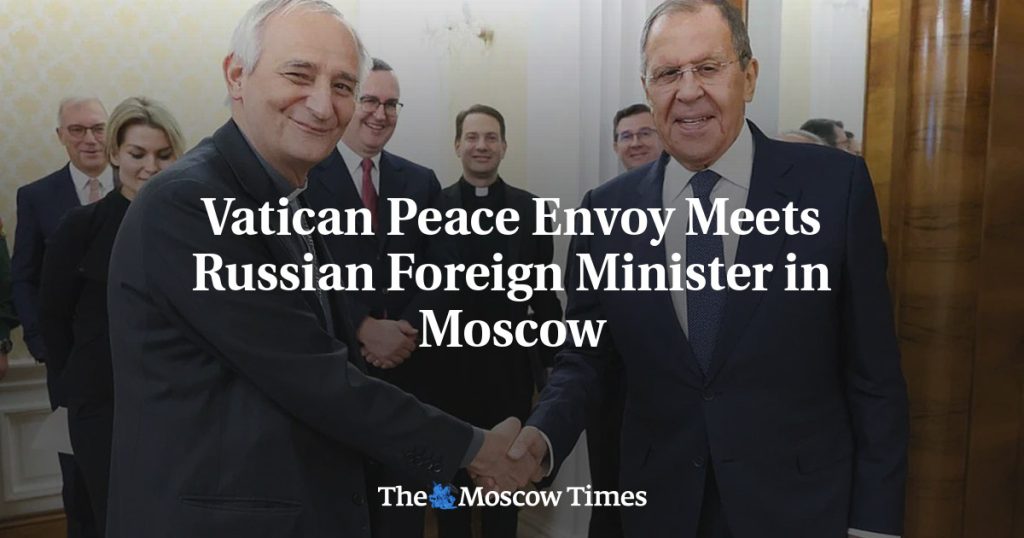Pope Francis’ Ukraine peace envoy Cardinal Matteo Zuppi met with Russian Foreign Minister Sergei Lavrov in Moscow to discuss efforts to reunite Ukrainian children with their families and exchange prisoners in the hopes of achieving peace. The Vatican emphasized the importance of these discussions in the context of the ongoing conflict in Ukraine, highlighting the humanitarian aspects of the situation. Patriarch Kirill, a prominent supporter of President Vladimir Putin and the offensive in Ukraine, was not scheduled to meet with Zuppi during this visit, indicating potential divisions within the Russian Orthodox Church.
The meeting between Zuppi and Lavrov was a continuation of the peace mission initiated by Pope Francis to bring an end to the war in Ukraine. Zuppi, who is the head of Italy’s Bishops’ Conference, was appointed by the Pope to lead diplomatic efforts in countries directly involved in the conflict, including China, Ukraine, and the United States. This visit to Moscow was part of a broader diplomatic tour aimed at fostering dialogue and cooperation toward a peaceful resolution to the crisis in Ukraine. The Vatican’s involvement in these peace talks underscores the significance of religious and humanitarian considerations in resolving conflicts.
The Vatican’s news website highlighted the specific focus of the discussions between Zuppi and Lavrov on facilitating the return of Ukrainian children who had been taken to Russia during the conflict. This issue is particularly sensitive as it involves the welfare and reunification of families affected by the ongoing hostilities. The exchange of prisoners was also a key point of discussion, reflecting efforts to address the human cost of the war and promote reconciliation between the opposing sides. These humanitarian gestures are seen as crucial steps toward building trust and laying the groundwork for lasting peace.
The role of Cardinal Matteo Zuppi as Pope Francis’ peace envoy underscores the significance of religious leadership in addressing conflicts and promoting reconciliation. His visit to Moscow, despite potential political and religious tensions, demonstrates the Vatican’s commitment to engaging with all parties involved in the conflict in Ukraine. By initiating dialogue and promoting humanitarian efforts, Zuppi and the Vatican are working towards healing the wounds of war and fostering a climate of peace and understanding in the region. The Vatican’s ongoing involvement in peace talks reflects a broader commitment to promoting justice, reconciliation, and the common good.
The willingness of Pope Francis to send a peace envoy to engage in diplomatic efforts in regions of conflict highlights the Vatican’s commitment to promoting peace and reconciliation on the global stage. By appointing Zuppi to lead these efforts in Ukraine and other countries affected by conflict, the Pope is emphasizing the importance of dialogue, cooperation, and humanitarian gestures in resolving complex geopolitical issues. The Vatican’s engagement in peace talks also underscores the spiritual and moral dimensions of conflicts, emphasizing the need for compassion, forgiveness, and healing in the aftermath of war. Through these peace missions, the Vatican seeks to be a force for good in the world, working towards a more peaceful and just society for all.
In conclusion, the meeting between Cardinal Matteo Zuppi and Russian Foreign Minister Sergei Lavrov in Moscow represents a continuation of diplomatic efforts to bring an end to the conflict in Ukraine. The discussions focused on humanitarian issues such as the reunification of Ukrainian children with their families and the exchange of prisoners, with the ultimate goal of achieving peace in the region. The Vatican’s involvement in these peace talks underscores the importance of religious and moral leadership in promoting reconciliation and healing in areas affected by conflict. As Pope Francis’ peace envoy, Zuppi plays a critical role in fostering dialogue, understanding, and cooperation among all parties involved in the conflict. Through these efforts, the Vatican seeks to be a voice for peace, justice, and compassion in a world beset by violence and division.


